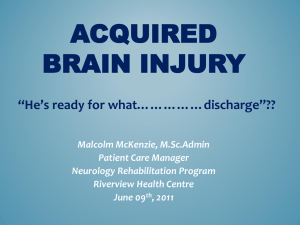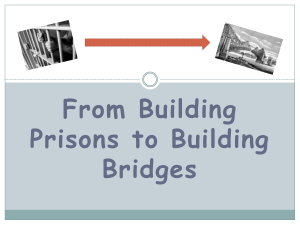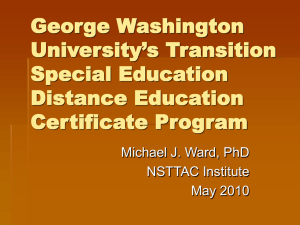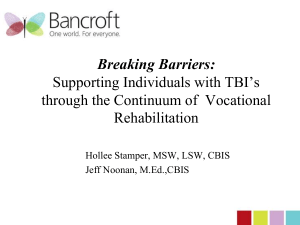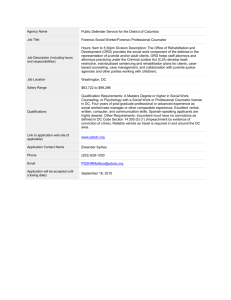Vocational Rehabilitation Program CLIENT SERVICES HANDBOOK
advertisement
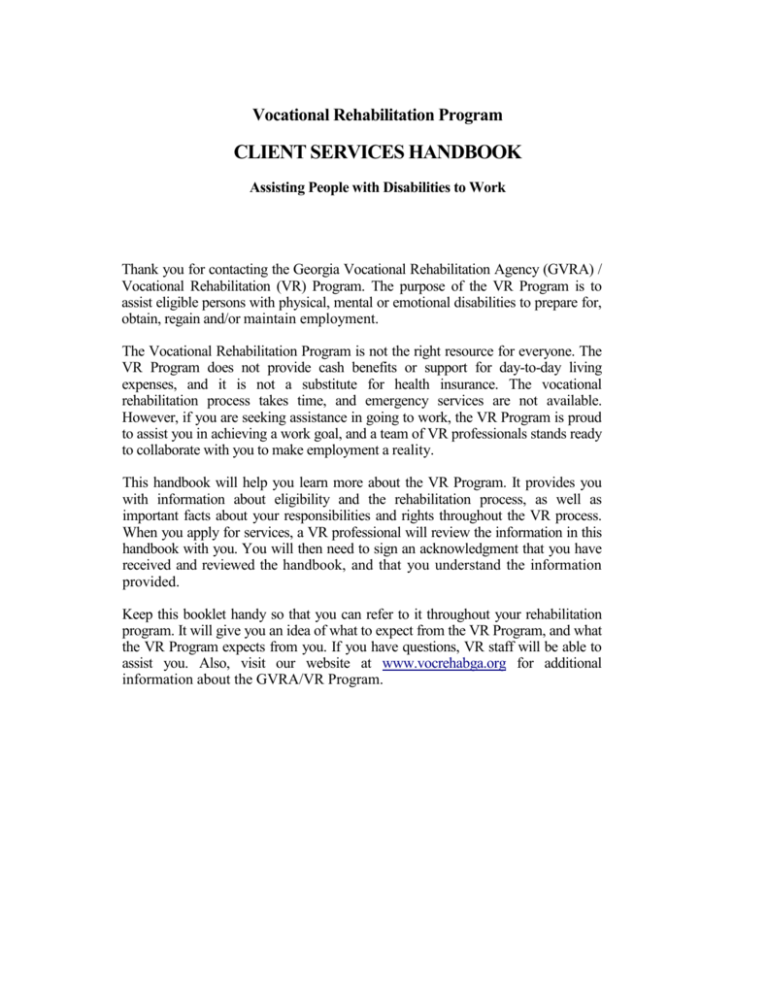
Vocational Rehabilitation Program CLIENT SERVICES HANDBOOK Assisting People with Disabilities to Work Thank you for contacting the Georgia Vocational Rehabilitation Agency (GVRA) / Vocational Rehabilitation (VR) Program. The purpose of the VR Program is to assist eligible persons with physical, mental or emotional disabilities to prepare for, obtain, regain and/or maintain employment. The Vocational Rehabilitation Program is not the right resource for everyone. The VR Program does not provide cash benefits or support for day-to-day living expenses, and it is not a substitute for health insurance. The vocational rehabilitation process takes time, and emergency services are not available. However, if you are seeking assistance in going to work, the VR Program is proud to assist you in achieving a work goal, and a team of VR professionals stands ready to collaborate with you to make employment a reality. This handbook will help you learn more about the VR Program. It provides you with information about eligibility and the rehabilitation process, as well as important facts about your responsibilities and rights throughout the VR process. When you apply for services, a VR professional will review the information in this handbook with you. You will then need to sign an acknowledgment that you have received and reviewed the handbook, and that you understand the information provided. Keep this booklet handy so that you can refer to it throughout your rehabilitation program. It will give you an idea of what to expect from the VR Program, and what the VR Program expects from you. If you have questions, VR staff will be able to assist you. Also, visit our website at www.vocrehabga.org for additional information about the GVRA/VR Program. The Vocational Rehabilitation Process YOUR RESPONSIBILITIES You are the most important person in the vocational rehabilitation process, so your active participation is critical to its success. You must work with your VR counselor and others on your rehabilitation team to plan for, prepare for and achieve your employment goals. Please be aware that the Vocational Rehabilitation (VR) Program could deny your application, suspend or terminate services, or close your case if you do not follow through with your responsibilities. Here is a list of your primary responsibilities: • • • • • To actively participate in your VR program by making your choices, needs and interests known to your counselor; To maintain regular communication, and to meet with your VR counselor as required, throughout your vocational rehabilitation program; To keep and be on time for appointments with your VR counselor, other VR staff and service providers. When this is not possible, you must notify your VR counselor's office as soon as possible so that your appointment can be rescheduled; To give honest and complete information, and to provide your VR counselor with access to information and records that will help your VR counselor in determining your eligibility for the VR Program, and in planning and continuing necessary services; To tell your VR counselor about changes in your situation; for example, changes in your address, phone number, medical or psychological condition, as well as changes in your SSI/SSDI check and other finances. YOUR RIGHTS The VR Program is responsible for making certain that you have every opportunity to succeed in your rehabilitation program, and that VR staff are being fair and helpful to you. You will always be made aware of your options, and you will be encouraged to make choices throughout your rehabilitation program. You have the right: • • • • To apply for services; To be considered for services without regard to your gender, age, race, birthplace, nationality, religion, sexual orientation or type of disability; To be evaluated to find out if the VR Program can assist you with employment related services; To have enough information to make appropriate informed choices from options available to you throughout the rehabilitation process. Informed choice is a • • • • decision-making process during which you analyze key information and actively participate in making selections. Options may include your participation in: selection of your work goal; the specific vocational rehabilitation services you are to receive; the providers from whom you receive services; and the methods used to obtain your Individualized Plan for Employment (IPE/Work Plan) services; To know of any decisions that affect your case, the reasons for those decisions, and to know about important changes in your program before they happen; To make a written appeal of any decision affecting your case; To know that your personal information will be kept private within the limits of the law; To ask for help and/or guidance from the Client Assistance Program. APPLICATION Any person who is available to participate in assessment and services in the state of Georgia who has a physical, mental or emotional disability that interferes with his or her ability to work may apply for vocational rehabilitation services. A VR staff member will assist you in completing an application for services. By completing an application, you are expressing your intent to go to work. It is important that you understand that participation in the VR Program could affect benefits you may be receiving, such as Social Security (SSI and SSDI), Food Stamps or Georgia Temporary Assistance for Needy Families (TANF). For example, your benefits may be reduced or eliminated once you go to work and earn income. ELIGIBILITY To be eligible for vocational rehabilitation services, you must have a physical, mental or emotional disability that substantially interferes with your ability to work. You must also require, and be able to benefit from, vocational rehabilitation services to prepare for, obtain, regain and/or maintain employment. If you receive Supplemental Security Income (SSI) or Social Security Disability Insurance (SSDI) based on your own disability and you intend to seek employment, you are presumed to be eligible for vocational rehabilitation services. Your VR counselor will use existing medical, psychological, vocational and assessment information about your disability. If needed, and at no cost to you, your VR counselor will get new information to help determine whether or not you are eligible to receive services. Eligibility for services is continuously evaluated. Assessments may determine that you are not ready for employment. If your condition changes your eligibility status may also change. WORK NEEDS ASSESSMENT After eligibility is established, you and your VR counselor will begin the process to develop your IPE/Work Plan. At that time, further assessments may be required to help you determine an appropriate vocational goal, and to identify the services needed to achieve that goal. Needs assessment activities may include additional medical, psychological or other specialist assessments, as well as a vocational and/or work evaluation. VR staff wants you to achieve employment success. Your VR team will help you to use job market information, including data on occupational trends and earning potential, to identify the kind of jobs in which you are interested and for which you are suited. Once you and your VR counselor agree on what job would be appropriate and what services are needed to attain that job, you are ready to move forward in the VR process. ORDER OF SELECTION Due to limited funding, the Georgia Vocational Rehabilitation Program operates under an Order of Selection system which ensures that people with the most significant disabilities are given the highest priority when being considered for services. Therefore, it is possible to be eligible for services, but have your case placed in a closed Order of Selection Priority Category. This means that services would not be available, but that you could request to be placed on a waiting list for future assistance. INDIVIDUALIZED PLAN FOR EMPLOYMENT (WORK PLAN) Your VR counselor will help you to develop a work plan called the Individualized Plan for Employment (IPE/Work Plan) which will include: • • • • • • The agreed upon vocational goal; Objectives and services that are necessary to reach your vocational goal; Evaluation measures to determine whether these objectives have been met; Service providers, length of time the services are needed, and funding sources for each service; Your responsibilities and any special conditions of your IPE/Work Plan; and The projected completion date. Your IPE/Work Plan: • • May be developed with the assistance of a family member, guardian, advocate or other authorized representative; Must be completed using the VR Program IPE/Work Plan format; • • • • Must be agreed upon and signed by both you and your VR counselor before it takes effect; May require you to pay part of the costs of your services; Must be reviewed by you and your VR. counselor at least once a year to see what progress you are making and to determine if changes in your services are needed; Will take as much time to complete as required based on your individual needs and approved services. The length of time will vary for each person. VOCATIONAL SERVICES VR services will include only those services that are necessary for you to reach your vocational goal and to become employed. Many services may require that you meet financial eligibility. Services will be provided directly by VR staff or will be arranged through approved providers. You will be asked to participate in choosing your service providers. The VR Program operates under guidelines that direct the scope, nature and fees for services, and ensures that providers meet and maintain credentials and qualifications. All services and items purchased for you must be approved, in advance, by your VR counselor. The VR Program will not pay for, nor reimburse you for, unapproved expenses. You will be required to apply for and use comparable benefits. These are funding sources for your planned services that are available through other programs and resources. Some examples of comparable benefits are financial aid for college/vocational school, Medicaid, Veterans Administration benefits and private medical insurance. Services received through the VR Program are dependent upon the availability of VR Program funds. When you and your VR counselor agree that you are ready to work, VR staff will help you to become employed. Staff assistance varies according to individual needs, and may include resume development, interview preparation, job referrals and/or employer contact information. Finding the right job is important and your active participation is essential. Many clients can and will find their own jobs. Others may need someone to assist them. Whatever your situation, VR Program staff will help make your transition to employment successful. After you are employed, VR staff will follow-up with you to make sure that both you and your employer are satisfied with your work. CASE CLOSURE After you have completed the objectives of your IPE/Work Plan and have been working successfully at your job for at least 90 days, your case will be closed. Your case may also be closed during the rehabilitation process for other reasons, such as your inability to continue to participate in your vocational rehabilitation program, your failure to keep a scheduled appointment with VR staff and/or service providers, or your indication that you are no longer interested in receiving services or in going to work. If your case is closed for any reason and you reapply for services, you may need to be assessed again to see if you are eligible for services, and to determine whether your vocational rehabilitation needs have changed. Certain situations will require that you wait a period of six months, or one year, before you can be reassessed for services. POST-EMPLOYMENT SERVICES You may be eligible for post-employment services, even after you have achieved and maintained your employment goal, and your case has been successfully closed. However, these services must be short-term, relatively minor, and required in order for you to maintain or regain employment. INFORMATION AND REFERRAL SERVICES If at any time it is determined that you need services that the VR Program does not provide, or if you cannot benefit from VR services in terms of an employment outcome, the VR Program will provide information and referral to other more appropriate resources to assist you with your needs. PROTECTION, USE AND RELEASE OF PERSONAL INFORMATION The Georgia Vocational Rehabilitation Agency/Vocational Rehabilitation Program protects your privacy by keeping all information about you confidential. The VR Program wants you to know why and how information in your case file is collected, protected, used and released. In order to assist you in going to work, the VR Program will need a great deal of personal information about you. A VR staff person will ask for your name, address, birth date, social security number, and your educational and employment history. You will need to tell VR staff about your disability, and provide information about your income and financial resources, as well as information about the income and resources of any individuals who are legally responsible for your support. Because the VR Program uses a team approach, your personal information will be shared with the VR professionals who are working to assist you with your employment needs. The VR Program will obtain your available medical and/or psychological records. You may also be sent to doctors who will give your VR team members information about you and your disability. You may be required to participate in other types of evaluations in which information about you and your activities will be assessed and reported to your VR counselor. All this information will be used to determine if vocational rehabilitation services can help you to find meaningful work. Sometimes, in order to provide you with services, VR Program staff will need to share information about you with another person, agency or employer. In these situations, VR will need your written consent. The VR Release of Information form states with whom the information is to be shared, the reason the information is to be shared, and the length of time the release is valid. There may also be situations when VR staff will be required to share information about you without your consent, including: • • • • • If necessary for the safety of you or another person; In response to investigations involving fraud or abuse; If ordered by a judge or required by law; If approved by Program administration for the purpose of an audit, evaluation or research; If you are a minor or not your own legal guardian, information in your case file may be available to your legal guardian or advocate. You may see or obtain copies of the information in your VR case file by requesting it in writing. Information that your VR counselor thinks will require detailed explanation may not be given directly to you, but will be given to someone such as a physician or a psychologist who will be able to clearly explain it to you. VR staff relies on you to provide accurate contact information. Staff will reply to an email address you use, and/or a telephone or fax number you provide. If others have access to the account or number you are using, and you do not want them to see your comments or the VR staff person's responses, please use another kind of communication. THE GEORGIA CLIENT ASSISTANCE PROGRAM The Client Assistance Program (CAP) helps people with disabilities who are seeking or receiving vocational rehabilitation services by providing information about the federal Rehabilitation Act, including: • • • • • • How the state can help you get, keep or advance in work; How you qualify for VR services; How you guide your own rehabilitation; The purpose of the Rehabilitation Act; Your rights under the Act; Assisting individuals who have problems applying for or receiving services under the Act. If you have a problem with your vocational rehabilitation application, work plan or program, the Client Assistance Program can assist you in many ways, including: Advising you of your rights; Solving communication problems; Teaching you how to make requests; Referring you to other agencies when appropriate; Negotiating for you; Mediating disputes; Advocating for you with the VR Program and others; Presenting your requests to the VR Program; Obtaining legal representation when appropriate. You may reach the Client Assistance Program by any of the following: Statewide Toll-Free Number Atlanta Area Number Georgia Relay Service No. Fax Number Web Site Address Email Address U. S. Mail Address Decatur, Georgia 30030 800-822-9727 404-373-2040 800-255-0135 404-373-4110 http://www.georgiacap.com gacapdirector@georgiacap.com 123 North McDonough Street TICKET TO WORK AND VOCATIONAL REHABILITATION Ticket to Work (TTW) is a work incentive program designed and implemented by the Social Security Administration (SSA). Under this Program, SSA provides recipients with a Ticket which may be used for work related services. If you have been issued a Ticket, please notify your VR counselor who will discuss how the Ticket to Work Program and VR can jointly assist you in becoming employed. If you would like to learn more about the Ticket to Work Program, please call toll free 1-866-968-7842 (TTY: 1-866-8332967). Information is also available at the program's web site: www.yourtickettowork.org. A resource called the Work Incentives, Planning and Assistance Program is available for Social Security recipients with disabilities. Trained staff can provide information and assistance on how employment will impact an individual's disability benefits. VR staff can tell you how to contact this Program, or you can call toll free 1-866-489-0001 (TTY: 1-866-373-7778) for additional information. We encourage you to take advantage of this valuable resource so that you can make informed choices about work. VOTER REGISTRATION The National Voter Registration Act is a law designed to make it easier for individuals to register to vote. You will be offered an opportunity to become a registered voter. State of Georgia Agency-Based Registration Application Declaration Statement Name: ________________________________ Date: ___________________ IF YOU ARE NOT REGISTERED TO VOTE WHERE YOU LIVE NOW, WOULD YOU LIKE TO REGISTER TO VOTE HERE TODAY? 1) 2) 3) 4) □ □ □ □ I am not a citizen of the United States of America. I am a citizen and I want to register to vote. I am already registered to vote. I do not want to register to vote. Applying to register or declining to register to vote will not affect the amount of assistance that you will be provided by this agency. IF YOU DO NOT CHECK ANY BOX, YOU WILL BE CONSIDERED TO HAVE DECIDED NOT TO REGISTER TO VOTE AT THIS TIME. If you would like help in filling out the voter registration application form, we will help you. The decision whether to seek or accept help is yours. You may fill out the application in private. If you believe that someone has interfered with your right to register or to decline to register to vote or your right to privacy in deciding whether to register or in applying to register to vote, you may file a complaint with the Secretary of State, Elections Division at 802 West Tower, 2 Martin Luther King, Jr. Drive, SE, Atlanta, Georgia 30334 or by calling 404-656-2871. If an applicant declines to register to vote, the declination shall be confidential and will be used only for voter registration purposes. COMMENTS/REMARKS: If an applicant refuses to sign the registration application, count as a declination and mark box 4 on this form. Note under comments: "Refused to sign application." If either box 1, 3, or 4 is checked, place the form in the declination file. Retain all declinations for 24 months. Form DS-95 ACKNOWLEDGEMENT I have received a copy of the Client Services Handbook from the Georgia Rehabilitation Agency/Vocational Rehabilitation Program and have reviewed it with a VR staff person. I understand my rights to confidentiality, to make informed choices about my vocational rehabilitation program, to contact the Client Assistance Program, and to appeal decisions made by my VR counselor. I also understand I have the responsibility to actively participate in my vocational rehabilitation program, and to make every effort to go to work. Client Signature________________________________ VR Program Copy Date ACKNOWLEDGEMENT I have received a copy of the Client Services Handbook from the Georgia Vocational Rehabilitation Agency/Vocational Rehabilitation Program and have reviewed it with a VR staff person. I understand my rights to confidentiality, to make informed choices about my vocational rehabilitation program, to contact the Client Assistance Program, and to appeal decisions made by my VR counselor. I also understand I have the responsibility to actively participate in my vocational rehabilitation program, and to make every effort to go to work. Client Signature _______________________________ Client Copy Date GVRA/VR Regional Offices Region 1: Rome, (706) 295-6407 Region 2: Gainesville, (770) 535-5930 Region 3A: Atlanta, (404) 657-2239 Region 3B: College Park, (770) 909-2838 Region 4: Newnan, (770) 254-7210 Region 5: Athens, (706) 354-3900 Region 6: Macon, (478) 751-6272 Region 7: Augusta, (706) 650-5600 Region 8: Columbus, (706) 649-7400 Region 10: Albany, (229) 430-4461 Region 11: Valdosta, (229) 333-2170 Region 12: Savannah, (912) 356-2130 Region 16: Deaf Services, (706) 655-5008 Region 17: Blind/Low Vision Services (478) 274-7676 To request an alternate format of this handbook, please contact your Regional Office. Instructions This page is not intended to be part of the hand-out (Accessibility Editor's Note: The following is the described text for the Voter Registration page of the CSH handbook, which is not conducive to Braille or screen reader access.) There is a tear-out form explaining that the National Voter Registration Act is a law designed to make it easier for individuals to register to vote, and that the prospective client will be offered an opportunity to become a registered voter. Here is the text on the form, which is titled State of Georgia, Agency-Based Registration Application, Declaration Statement. There is a place for the client to insert his or her name, as well as the date. If you are not registered to vote where you live now, would you like to register to vote here today? There are four choice boxes; the client is asked to select one. One, I am not a citizen of the United States of America. Two, I am a citizen and I want to register to vote. Three, I am already registered to vote. Four, I do not want to register to vote. Applying to register or declining to register to vote will not affect the amount of assistance that you will be provided by this agency. If you do not check any box, you will be considered to have decided not to register to vote at this time. If you would like help in filling out the voter registration application form, we will help you. The decision whether to seek or accept help is yours. You may fill out the application in private. If you believe that someone has interfered with your right to register or to decline to register to vote or your right to privacy in deciding whether to register or in applying to register to vote, you may file a complaint with the Secretary of State, Elections Division at 802 West Tower, 2 Martin Luther King, Jr. Drive, SE, Atlanta, Georgia 30334 or by calling 404-656-2871. If an applicant declines to register to vote, the declination shall be confidential and will be used only for voter registration purposes. If an applicant refuses to sign the registration application, count as a declination and mark box 4 on this form. Note under comments: "Refused to sign application." If either box 1, 3, or 4 is checked, place the form in the declination file. Retain all declinations for 24 months. Space is provided for comments and remarks. There are two copies of an acknowledgement form that the client must sign and date. One copy is removed from the handbook and is placed in the VR file; the other is for the client's file. Here is the text on the acknowledgement form.
